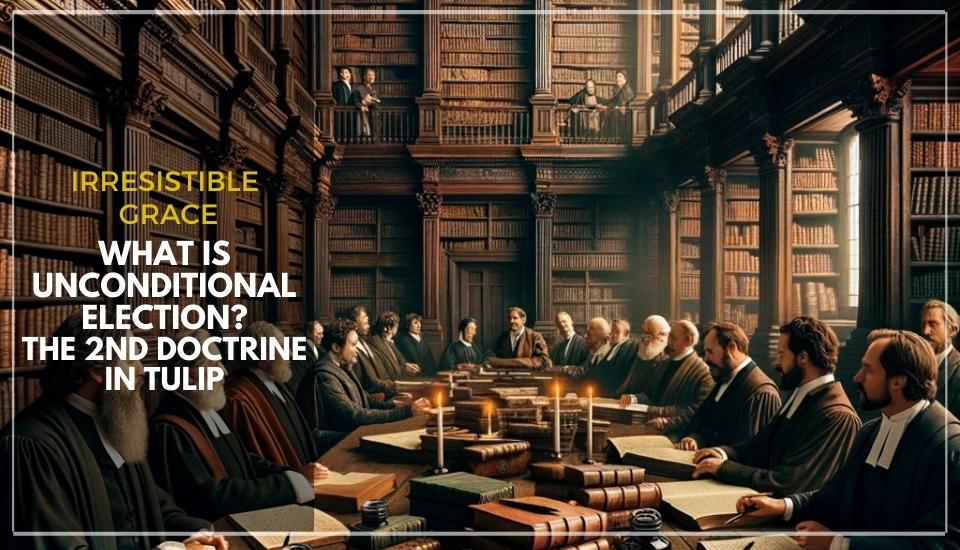What You’ll Learn
Key Takeaways
- Foundational to Calvinism: Unconditional election is a core doctrine in Calvinism, emphasizing God’s sovereign choice in salvation.
- God’s Sovereignty and Grace: Salvation is a result of God’s grace alone, not dependent on human merit or actions.
- Scriptural Roots: Key scriptures like Romans 9 and Ephesians 1 provide the biblical foundation for this doctrine.
- Critiques and Fairness: The doctrine faces critiques about God’s fairness and the role of human free will.
- Reformed Theology’s Defense: Proponents defend unconditional election, highlighting its role in upholding God’s sovereignty and eliminating human boasting.
- Historical and Theological Depth: Understanding unconditional election requires exploring its historical origins, biblical basis, and engaging with its critiques and defenses.
Understanding Unconditional Election
What is Unconditional Election?
Unconditional Election refers to the belief in Calvinism that God selects certain people for salvation solely out of His grace and mercy, not based on their actions, merits, or faith. This choice is made by God alone, highlighting His sovereign nature in the process of salvation.
Unconditional Election and Calvinism
Unconditional election is a pivotal doctrine in Calvinism, asserting that God chooses certain individuals for salvation based entirely on His grace, irrespective of their actions or choices. This decision reflects God’s sovereign will, established before the creation of the world.
- Sovereign Choice: God’s election is a demonstration of His supreme authority, illustrating His control over all aspects of creation.
- Not Based on Merit: The chosen ones are not selected because of their deeds, faith, or potential; it is purely a gift from God’s grace.
Origin and History of the Doctrine
The doctrine of unconditional election has its roots in history, initially formed by Augustine and later refined by John Calvin in the 16th century.
- Augustinian Foundations: Augustine laid the groundwork with his focus on predestination and God’s sovereign choice.
- Calvin’s Development: John Calvin expanded these ideas, embedding them into a comprehensive theological system known as Calvinism.
| Theologian | Contribution to Unconditional Election |
|---|---|
| Augustine | Emphasized predestination and God’s sovereign choice |
| John Calvin | Developed and popularized the doctrine within Calvinism |
Key Scriptures Supporting Unconditional Election
Various passages in the Bible are interpreted by Calvinists to support unconditional election, highlighting God’s sovereign role in the process of salvation.
- Romans 9: Paul addresses God’s choice of Jacob over Esau, emphasizing that their actions prior to birth did not influence God’s decision. This underlines that God’s election is rooted in His purpose and will.
- Ephesians 1: Paul talks about predestination and adoption, attributing these processes to God’s will and grace.
These scriptures reinforce the central tenets of unconditional election, highlighting God’s sovereignty, the non-reliance on human merit for salvation, and grounding God’s choice in His purpose and pleasure.
Unpacking the Doctrine of Unconditional Election
The Role of Calvinism in Unconditional Election
Calvinism plays a crucial role in shaping the doctrine of unconditional election, offering a systematic theological framework that emphasizes God’s sovereign choice in salvation.
- Foundation in Sovereignty: Calvinism holds that God’s sovereignty is the basis for His ability to choose individuals for salvation without any conditions.
- TULIP: Unconditional election is one of the five points of Calvinism, represented by the “U” in the acronym TULIP.
Table: The Five Points of Calvinism (TULIP)
| Point | Meaning |
|---|---|
| T | Total Depravity |
| U | Unconditional Election |
| L | Limited Atonement |
| I | Irresistible Grace |
| P | Perseverance of the Saints |
- John Calvin’s Influence: John Calvin, the founder of Calvinism, was instrumental in articulating and spreading the doctrine of unconditional election.
Exploring Romans 9 and Ephesians
Romans 9 and Ephesians are pivotal chapters in the Bible that provide deep insights into the concept of unconditional election.
- Romans 9: Paul discusses God’s sovereignty and the nature of His choice, using the example of Jacob and Esau to illustrate that God’s election is not based on human actions.
- Ephesians 1: This chapter highlights predestination and God’s eternal purpose, underscoring that individuals are chosen for salvation according to God’s will and grace.
Key Verses from Romans 9 and Ephesians
| Book | Verse | Content |
|---|---|---|
| Romans 9 | 11-13 | “Though they were not yet born, and had done nothing either good or bad—in order that God’s purpose of election might continue, not because of works but because of him who calls— she was told, “The older will serve the younger.” As it is written, “Jacob I loved, but Esau I hated.”” |
| Ephesians 1 | 4-5 | “Even as he chose us in him before the foundation of the world, that we should be holy and blameless before him. In love he predestined us for adoption to himself as sons through Jesus Christ, according to the purpose of his will.” |
- Doctrine of Election: These chapters collectively contribute to a comprehensive understanding of the doctrine of election, underscoring the Calvinist view of God’s unconditional choice.
Relationship between Unconditional Election and the Doctrine of Total Depravity
The doctrine of unconditional election is intricately connected to the doctrine of total depravity, another key tenet of Calvinism.
- Human Inability: Total depravity teaches that humanity is so fallen and sinful that no one is able to come to God or choose salvation on their own.
- God’s Grace: Unconditional election highlights that it is solely God’s grace and choice that brings individuals to salvation, not their own efforts or decisions.
- Complementary Doctrines: Together, these doctrines underscore the Calvinist view of salvation, emphasizing God’s sovereign role and the helplessness of humanity without His grace.
These elements collectively provide a comprehensive understanding of the doctrine of unconditional election, showcasing its roots in Calvinism, its biblical foundations, and its relationship with other key Calvinist doctrines.
Critical Perspectives and Objections to Unconditional Election
If You Want Results-Focused Consulting or an Unforgettable Speaker, Inquire About Booking Dr. Jackson Today.
Challenges to God’s Fairness and Justice
Critics of unconditional election often raise concerns about the implications of the doctrine on God’s fairness and justice.
- Perceived Inequality: Some argue that unconditional election creates a scenario where God appears to favor some individuals over others without any clear or just reason.
- Questions of Free Will: Critics also question how human free will can exist alongside a doctrine that asserts God unconditionally elects some for salvation.
Common Objections and Responses
| Objection | Response |
|---|---|
| It’s unfair for God to choose some and not others | God’s choices are grounded in His sovereign will and grace, not human merit |
| Unconditional election negates free will | Calvinists argue that human free will is compatible with God’s sovereign election, as humans willingly follow their own desires, which are ultimately shaped by God’s sovereign will |
Addressing Concerns of Predestination and Determinism
Unconditional election is closely tied to the concepts of predestination and determinism, leading to various debates and discussions.
- Predestination: This is the belief that all events, including salvation, are predetermined by God.
- Determinism: A broader philosophical concept where all events, including human actions, are determined completely by previously existing causes.
- Calvinist Perspective: Calvinists hold that while God predestines individuals for salvation, this does not negate human responsibility or the genuine offer of salvation to all.
Reformed Theology and the Defense of Unconditional Election
Reformed theology robustly defends the doctrine of unconditional election, providing scriptural and theological arguments in its favor.
- Biblical Foundation: Proponents point to various scriptures, such as Romans 9 and Ephesians 1, as clear evidence of unconditional election.
- God’s Sovereignty: The doctrine is seen as upholding God’s sovereignty, emphasizing that He is in complete control of salvation.
- Not Based on Human Merit: Supporters argue that unconditional election rightly removes any grounds for human boasting, placing the focus solely on God’s grace.
Reformed Theology and Unconditional Election
| Aspect | Description |
|---|---|
| Scriptural Support | Cites specific passages that highlight God’s sovereign choice in salvation |
| Upholding Sovereignty | Emphasizes God’s absolute authority and control in the process of salvation |
| Removing Human Boasting | Ensures that salvation is seen as a gift of grace, not something earned or deserved |
These discussions and defenses collectively provide a rounded view of the challenges and perspectives surrounding unconditional election, showcasing the debates, the scriptural foundations, and the theological arguments that surround this complex doctrine.
Grace Ambassador: Bringing Heaven To Earth
As believers, we have received unimaginable grace from the Father. Unfortunately, we often separate our spiritual life from our everyday lives. We fail to value the grace given to us, and we miss the opportunity to bring heaven to earth. Then we wonder what light we can bring to a world in deep darkness.




